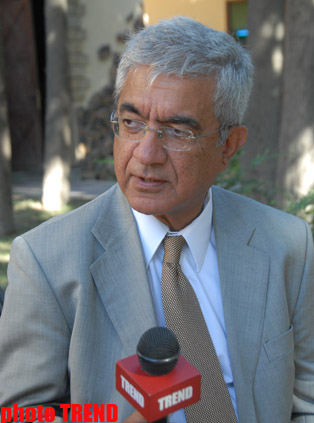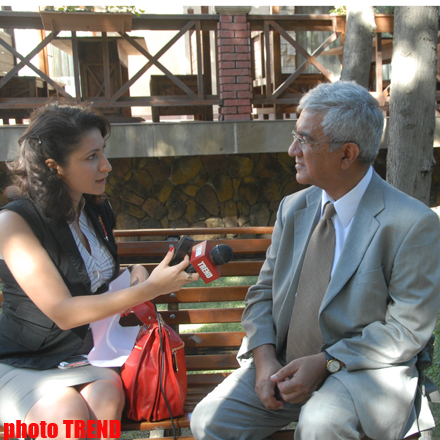Azerbaijan, Baku, July 9 / Trend E.Tariverdiyeva /
Trend interviews Azerbaijani Deputy Foreign Minister and Azerbaijan Diplomatic Academy (ADA) Rector Hafiz Pashayev on the occasion of Azerbaijani Diplomacy Day.
Trend: Azerbaijan is celebrating Diplomacy Day July 9. We heartily congratulate you on this holiday and wish you further success in the field.
How do you assess Azerbaijani diplomatic achievements since gaining independence?
Hafiz Pashayev: Thank you for your congratulations.
First and foremost, Azerbaijani diplomacy has ensured the very independence of Azerbaijan. Diplomats are people who ensure our independence on the international arena every year.
If we were to trace Azerbaijan's path over these years, it would be very gratifying to see that our diplomacy played a key role in our national achievements. Azerbaijan established its position on the world political map as a sovereign state. This is a source of pride for Azerbaijani diplomacy.
As for me, personally, as the Azerbaijani ambassador to the United States, I was responsible for ensuring the recognition of Azerbaijani interests in Washington. I'm pleased with my work, as Azerbaijani-U.S. relations jumped from zero to the level of strategic partnership. Now diplomatic processes are in progress.
Regarding my current activities, I think I continue to serve on the forefront by preparing young diplomats who will administer our diplomacy in the future.
Q.: What are the major challenges that Azerbaijani diplomacy will face in the near future?
A.: The major tasks facing Azerbaijani diplomacy are the same as they were in the early years of our sovereign state's formation - to strengthen our independence and to try to make sure that Azerbaijan strengthens its leading position in all senses - not only in the South Caucasus. Diplomatic successes determine Azerbaijan's' achievements in other areas. This is why diplomacy should lead the way and set an example for other spheres of life in Azerbaijan.
Q.: Finding a peaceful settlement to the Nagorno-Karabakh conflict is a challenge facing Azerbaijani diplomats. What are the prospects of resolving this conflict in the near future?
A.: I hope for a peaceful resolution to the Nagorno-Karabakh conflict. Much is being done by Azerbaijani President Ilham Aliyev and the international mediators, who are trying to help the parties reach an agreement. This is a complicated conflict and it is difficult to make forecasts. But the fact that Azerbaijan stands firmly on its feet, and continues to achieve significant successes on the international area, contributes to resolving the conflict.
It will be much easier to reach a peaceful resolution if the world knows more about Azerbaijan as a developing country, and if the international community is better aware of the nature of the conflict, which will help break down stereotypes and double standards.
Q.: What progress has the ADA achieved since its establishment?
A.: The ADA is a relatively new university. One of our priorities is to build a platform to train skilled diplomats, who are needed for our diplomatic missions abroad. As a result, I consider my position as rector to a very responsible job.
The number of Azerbaijani diplomatic missions is growing rapidly. Our task is to ensure that these embassies and consulates are stocked with experienced personnel. I am very pleased that, already in our first years of training young diplomats, we have borne fruit. We train 30 diplomats per year and they proceed to work successfully in our diplomatic missions abroad. Our ambassadors are very satisfied with their level of training.
Q.: The ADA has myriad new projects. Which are the most successful?
A.: This is our second year. We now offer a master's of science in addition to our diplomatic training programs. The program has been very successful as important and meaningful processes continue to take place in our region. The developments in our region are important for the entire international community. Our Caspian studies program is particularly interesting. We taught eight foreign and 14 Azerbaijani students during the first year of the degree. I should say that this year twelve foreigners can receive their master's.
Another important task is turning our academy into a research center. We are organizing summer schools on energy issues, which is a priority project in this regard. This week, we opened the fourth summer school, which was attended by over 40 individuals from 20 countries.
This project is very popular and unique. Azerbaijan, particularly Baku, is a kind of oil and gas industry laboratory. The country is immensely interesting to international specialists from the standpoint of the energy sector's historical development, as well as the contemporary political and economic processes associated with oil and gas issues. We received about 200 applications from international and domestic candidates after we announced our 2010 summer program. We also invited professors from leading U.S., European and Asian universities, as well as energy company representatives, to teach in our program.
The summer school aims to familiarize international experts with contemporary Azerbaijan, our achievements and our realities. This is a very significant aspect of our work. Thus, I think Azerbaijani diplomacy has a great deal much to be proud of.








